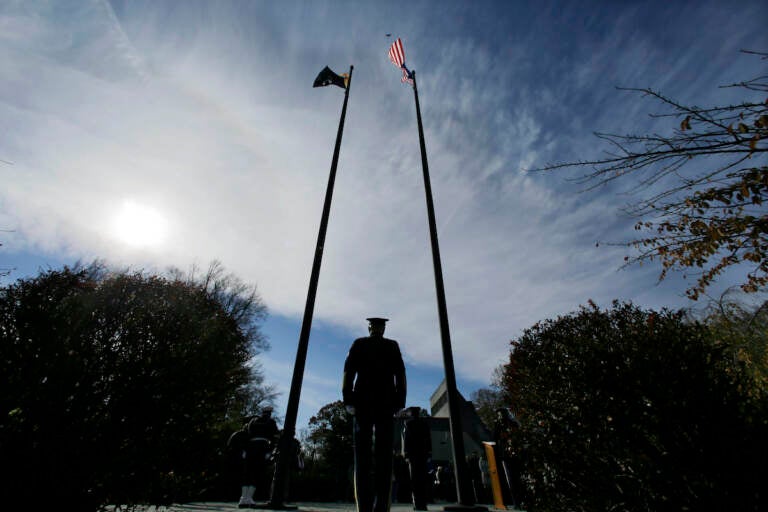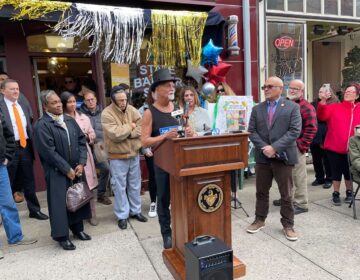N.J. veterans want better mental health services for ‘other-than-honorable’ discharges
New Jersey veterans joined state senators, medical experts, and former Governor Jim McGreevey, calling for benefits for vets with service related trauma.

File photo: Military personnel stand at attention during Veterans Day ceremonies at Brig. Gen. William C. Doyle Veterans Memorial cemetery, in Wrightstown, N.J. (AP Photo/Mel Evans)
Brett D’Alessandro served in the Marines from 2010 to 2016 in Afghanistan, but when he came back home, he struggled.
“When I got back from my deployment to Afghanistan, a lot of my buddies, including myself, were using drugs and alcohol to really cope for what we were feeling,” he said.
He said he was lucky enough to get into drug and alcohol treatment. But he said others ended up using heroin or opioids, which led to an other-than-honorable discharge.
“Unfortunately, a lot of veterans, especially marines … we have a lot of pride, and sometimes going to seek help, it could kind of hurt us in the long run.”
Over the years, some military veterans have said the trauma of witnessing combat led them to drugs and alcohol. That then leads to an “other-than-honorable discharge” which can bar them from medical services. NPR correspondent Quil Lawrence, who has covered veterans’ issues for years, once compared it to “a scarlet letter.”
Other-than-honorable discharge is different from bad conduct and dishonorable discharge, which are for people who commit serious crimes.
Veterans who receive an other-than-honorable discharge typically do not qualify for benefits from the Department of Veterans Affairs, and are at a high risk of suicide.
Brian Gillespie, who works with veterans as part of his work at the New Jersey Marine Corps League, said he has seen many cases like that, and it starts with post traumatic stress disorder that comes from combat experience.
“They’re masking it with the substance use disorder. And we’re dealing with the trauma along with the addiction,” he said. “I’ve had horror stories from them that they said they’ve tried to get through stuff … they had no services for them.”
Gillespie, D’Alessandro, and other veterans in New Jersey, joined a panel of New Jersey senators, medical experts, and former New Jersey Governor Jim McGreevey, in asking for laws to change that. They want the state to open up state benefits to veterans based on a diagnosis of service related trauma, including post traumatic stress disorder, traumatic brain injury, and military sexual trauma.
They spoke at a press conference organized by the New Jersey Reentry Corporation, a nonprofit that helps people returning from jail or prison, led by McGreevey. The nonprofit pointed out that California, New York, and Connecticut have passed similar legislation in recent years.
Late in 2020, the Army settled a class action lawsuit on behalf of Iraq and Afghanistan veterans who were denied benefits because of other-than-honorable discharge.
The VA has started addressing this problem in recent years, by providing emergency mental health coverage for veterans who got an other-than-honorable discharge, and expanding the criteria for which veterans qualify for health care services. Last week, the VA noted that they have provided almost three times as many mental health visits to veterans with an other-than-honorable discharge in 2021, compared to 2020.
But Brett D’Alessandro said the programs still have room for improvement. For instance, he pointed out that if programs require a printed form, or a meeting at a particular location, a veteran can only use those programs if they have a cell phone, a printer, or a car.
He co-founded and runs the veteran support and mentorship organization, Backpacks For Life, with his partner, Alexa Modero.
“You can’t expect veterans to walk in as the perfect veteran with flawless credentials and not having gone through things, whether that’s mental or physical ailments,” she said. “So you need to meet the veterans where they’re at.”
WHYY is your source for fact-based, in-depth journalism and information. As a nonprofit organization, we rely on financial support from readers like you. Please give today.







